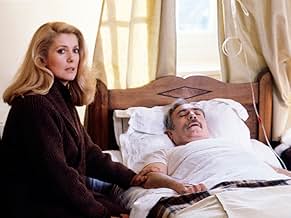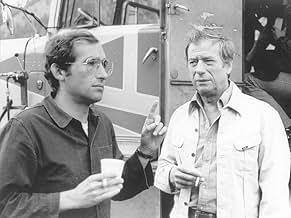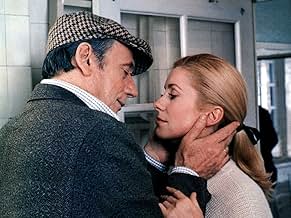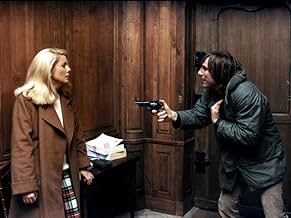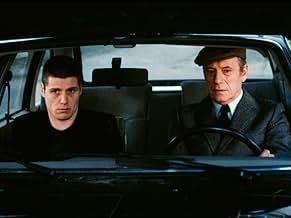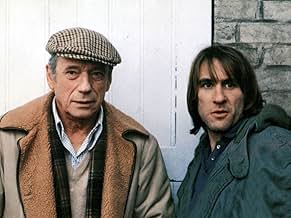NOTE IMDb
6,9/10
2,2 k
MA NOTE
Alors qu'il mène une vie tranquille, un ancien truand se retrouve confronté à un jeune tueur au caractère impulsif.Alors qu'il mène une vie tranquille, un ancien truand se retrouve confronté à un jeune tueur au caractère impulsif.Alors qu'il mène une vie tranquille, un ancien truand se retrouve confronté à un jeune tueur au caractère impulsif.
- Réalisation
- Scénario
- Casting principal
Avis à la une
.. of superlatives. This, the last of the three polars that Corneau made top-billing Montand, finds Montand retired from the mob and roughing it with Catherine Deneuve in a large country chateau where they breed thoroughbreds. Such an idyll can't last, natch, so, before you can say 'make my day, punk', enter Depardieu, hothead extaordinaire, on the lam and looking for a soft touch. Eventually we need the obligatory scene in which the ageing gunfighter dusts off the old six-shooter and wastes the wannabee new fastest gun, except, of course, that this isn't a Western but a very sophisticated and hugely enjoyable polar.It doesn't get any better than Montand and Depardieu (who had worked together earlier in Claude Sautet's 'Vincent, Paul, Francois et les autres' and would do so again in 'Jean de Florette') and with Corneau on bullhorn what's not to like. Post-war French policiers/polars are in a class of their own and provided your nose is in good working order the whiff of cordite can be identified at once as generated by Jean Pierre Melville, Alain Corneau, Tavernier, etc. This one is right out of the top drawer and would BE a top drawer on any screen it graced. Go see! Enjoy!
'Choice of Arms' (the French title is 'Le choix des armes') made in 1981 is a very typical film for the genre of film noir in the French cinema of the 70s and 80s. The master of the genre was Jean-Pierre Melville who died in 1973, leaving behind only 14 films, but a few masterpieces among them. Alain Corneau, the director of 'Choice of Arms' was one of his followers. This film shows his professional qualities, and withstands the test of time, mainly due to its stellar cast.
This is the story of the aftermath of an escape from prison, of the mob milieu friends of the evaders who shelter and help them, and of the cops who are following them, a story that tragically turns bad and worse as it advances. As in many films of the genre, the two worlds - crime and law - are interlinked by sometimes invisible threads. In each of them two generations are confronted, the old generation of active or retired gangsters and policemen on one side, the young violent criminals and ambitious policemen on the other side. Corruption rules at all levels. Good intentions and human feelings hardly survive the pursuits and shootings.
The cinematographic production is quite minimalist. Part of the story takes place in the streets and on muddy country roads, with the street corners and intersections playing an important role in the action. Sumptuous villas and the overcrowded apartments in the 'banlieus' clearly separate the social categories. The color palette is very strictly controlled, the film could have been very well made in black and white. Gérard Depardieu plays here the role of a criminal, disturbed young man, anti-social beyond any hope, who destroys everything around, and first of all destroys his own life. Depardieu does not show yet the charisma and especially the humor that characterize many of his later great roles, he has moments of overacting, but the hopeless uncertainty and the aspiration to get out of the vicious circle of crime are excellently rendered. Yves Montand and Catherine Deneuve form a couple that seems to descend from another film, but precisely the contrast between his carved by life noble calm together with her vulnerable beauty and the brutal story and the acts of violence around manage to create drama and tension. The soundtrack is also very interesting. At times, the violins and sentimental melodies in the style of the 50s are used annoyingly, but in other jazz improvisations on guitar and soul music (Janis Joplin if I'm not mistaken) are a perfect match for what happens on screen. 'Choice of Arms' may not be Alain Corneau's best film, but it is worth watching or re-watching.
This is the story of the aftermath of an escape from prison, of the mob milieu friends of the evaders who shelter and help them, and of the cops who are following them, a story that tragically turns bad and worse as it advances. As in many films of the genre, the two worlds - crime and law - are interlinked by sometimes invisible threads. In each of them two generations are confronted, the old generation of active or retired gangsters and policemen on one side, the young violent criminals and ambitious policemen on the other side. Corruption rules at all levels. Good intentions and human feelings hardly survive the pursuits and shootings.
The cinematographic production is quite minimalist. Part of the story takes place in the streets and on muddy country roads, with the street corners and intersections playing an important role in the action. Sumptuous villas and the overcrowded apartments in the 'banlieus' clearly separate the social categories. The color palette is very strictly controlled, the film could have been very well made in black and white. Gérard Depardieu plays here the role of a criminal, disturbed young man, anti-social beyond any hope, who destroys everything around, and first of all destroys his own life. Depardieu does not show yet the charisma and especially the humor that characterize many of his later great roles, he has moments of overacting, but the hopeless uncertainty and the aspiration to get out of the vicious circle of crime are excellently rendered. Yves Montand and Catherine Deneuve form a couple that seems to descend from another film, but precisely the contrast between his carved by life noble calm together with her vulnerable beauty and the brutal story and the acts of violence around manage to create drama and tension. The soundtrack is also very interesting. At times, the violins and sentimental melodies in the style of the 50s are used annoyingly, but in other jazz improvisations on guitar and soul music (Janis Joplin if I'm not mistaken) are a perfect match for what happens on screen. 'Choice of Arms' may not be Alain Corneau's best film, but it is worth watching or re-watching.
On the basis of a very traditional diagram, almost austere in its banality, Michel Grisolia, the scenario writer, gave his realizer a springboard from which this last built a true psychological drama, rich of subtle nuances and learnedly worked drafts. The police aspect interests less Corneau than the painting of the underworld, than the denunciation of the police methods or than the purulent proletarian company of today. The setting in scene is fantastic and remarkable is interpretation (Depardieu!), let us announce however a light Manicheism and certain doubtful psychological analyses.
A gracefully paced and ably directed work featuring highly talented players, including Gerard Depardieu and Catherine Deneuve, along with Yves Montand, LE CHOIX DES ARMES is generally successful as cinematic art, although it must be stressed that it should properly be viewed in its French language format, since the subtitled American release is harshly cut and reveals post-production efforts not at all sympathetic with the original release. An escaped convict and killer, Mickey (Depardieu), chooses to hide from police pursuit upon the lavish estate of former organized crime doyen Noel Durrieux (Montand) and his wife Nicole (Deneuve, with a wonderfully layered interpretation of her rôle), but when detectives come near, Mickey flees to Paris, although he soon returns, bringing about a conflict between two criminal codes after Mickey believes that Durrieux has informed police of the escapee's location. There are carefully fleshed out parts here for numerous characters as the two principal antagonists career toward an inevitable climactic meeting, it becoming increasingly apparent that there are lessons to be learned beyond those of the scenario and they may not be divulged by ancillary figures. Auteur Corneau's metronomic tone mates well with the script's finely balanced, rather spare, dialogue, and with a complex plot not immediately pervious to a viewer, the film benefits from the director's ability to weave a diverse cast of characters into a discriminatory dramatic construction. Deneuve earns acting honours, while Depardieu is highly effective as a sociopath savaged by paranoia yet displaying a wide range of emotional engagement with disparate characters, and Montand is icily persuasive as a "retired" mob leader who is forced to reenter his past in the hope of achieving safety for him and his wife. Following a slowly gaited but logical storyline is difficult with the extensive cutting performed upon the film's U.S. version, that is burdened as well with poor sound transference and largely inferior processing, very unfortunate in this instance of a solidly crafted motion picture that deserves better.
Alain Corneau began as assistant to Costa-Gavras so it is only fitting that as a fully-fledged director he should work with Yves Montand. This fine actor had previously starred in 'Le Cercle Rouge' for Jean-Pierre Melville and of the three policier/polar noirs that Corneau and Montand were to make this last one is the nearest to the Melvillian style, in terms of pacing, atmosphere, its depiction of the criminal 'code' and the wafer thin distinction between the gangsters and the guardians of law and order. This is very much a man's world and a pretty cold and brutal one it is at that.
Montand is Noel, a former underworld figure who has used his ill-gotten gains to finance an extremely comfortable lifestyle as a breeder of thoroughbreds but is obliged by an unexpected train of events to revert to the law of the jungle. On the other side of the coin is the deranged psychopath and prison escapee Mickey of Gérard Depardieu who is humanised only by his love for his child which mirrors Noel's love for Catherine Deneuve as Nicole, his wife. Although their backgrounds and social milieus could not be more strikingly different, both men have more in common than they realise and ultimately(SPOILER COMING) the orphaned child becomes the indissoluble link between them. A further contrast is offered between the old school police chief of Michel Calabru and the intense, trigger-happy, fanatical young inspector of Gérard Lanvin.
This is a well constructed piece with a measured pace that allows the characters to develop and with an utterly riveting second half. It is beautifully shot by Pierre William Glenn, tautly scripted by former critic Michel Grisolia and atmospherically scored by Philippe Sarde.
Nicole is assuredly not the most demanding role that Catherine Deneuve has been called upon to play but the simpatico between her and the magnificent Montand is palpable and helps the film to work. They had earlier worked together on the rom-com 'Le Sauvage'. Likewise there could not be a greater contrast between this and her recent collaboration with Depardieu, 'Le Dernier Metro'. He is larger than life here but always 'true' which is a difficult balance to strike and as usual brings his air of unpredictability. Many have lamented that with maturity he has rather 'let himself go' but when Montand, who worked with him three times, referred to him as 'THE actor of his generation', he wasn't far wrong.
Montand is Noel, a former underworld figure who has used his ill-gotten gains to finance an extremely comfortable lifestyle as a breeder of thoroughbreds but is obliged by an unexpected train of events to revert to the law of the jungle. On the other side of the coin is the deranged psychopath and prison escapee Mickey of Gérard Depardieu who is humanised only by his love for his child which mirrors Noel's love for Catherine Deneuve as Nicole, his wife. Although their backgrounds and social milieus could not be more strikingly different, both men have more in common than they realise and ultimately(SPOILER COMING) the orphaned child becomes the indissoluble link between them. A further contrast is offered between the old school police chief of Michel Calabru and the intense, trigger-happy, fanatical young inspector of Gérard Lanvin.
This is a well constructed piece with a measured pace that allows the characters to develop and with an utterly riveting second half. It is beautifully shot by Pierre William Glenn, tautly scripted by former critic Michel Grisolia and atmospherically scored by Philippe Sarde.
Nicole is assuredly not the most demanding role that Catherine Deneuve has been called upon to play but the simpatico between her and the magnificent Montand is palpable and helps the film to work. They had earlier worked together on the rom-com 'Le Sauvage'. Likewise there could not be a greater contrast between this and her recent collaboration with Depardieu, 'Le Dernier Metro'. He is larger than life here but always 'true' which is a difficult balance to strike and as usual brings his air of unpredictability. Many have lamented that with maturity he has rather 'let himself go' but when Montand, who worked with him three times, referred to him as 'THE actor of his generation', he wasn't far wrong.
Le saviez-vous
- AnecdotesThe German dubbed 35mm Dolby Stereo prints did have a sound error: parts within each reel were side-reversed, i.e. what was intended to be heard from the left front speaker was actually heard from the right front speaker.
- ConnexionsReferenced in Girare Le choix des armes (2007)
Meilleurs choix
Connectez-vous pour évaluer et suivre la liste de favoris afin de recevoir des recommandations personnalisées
- How long is Choice of Arms?Alimenté par Alexa
Détails
Contribuer à cette page
Suggérer une modification ou ajouter du contenu manquant

Lacune principale
By what name was Le choix des armes (1981) officially released in Canada in English?
Répondre
